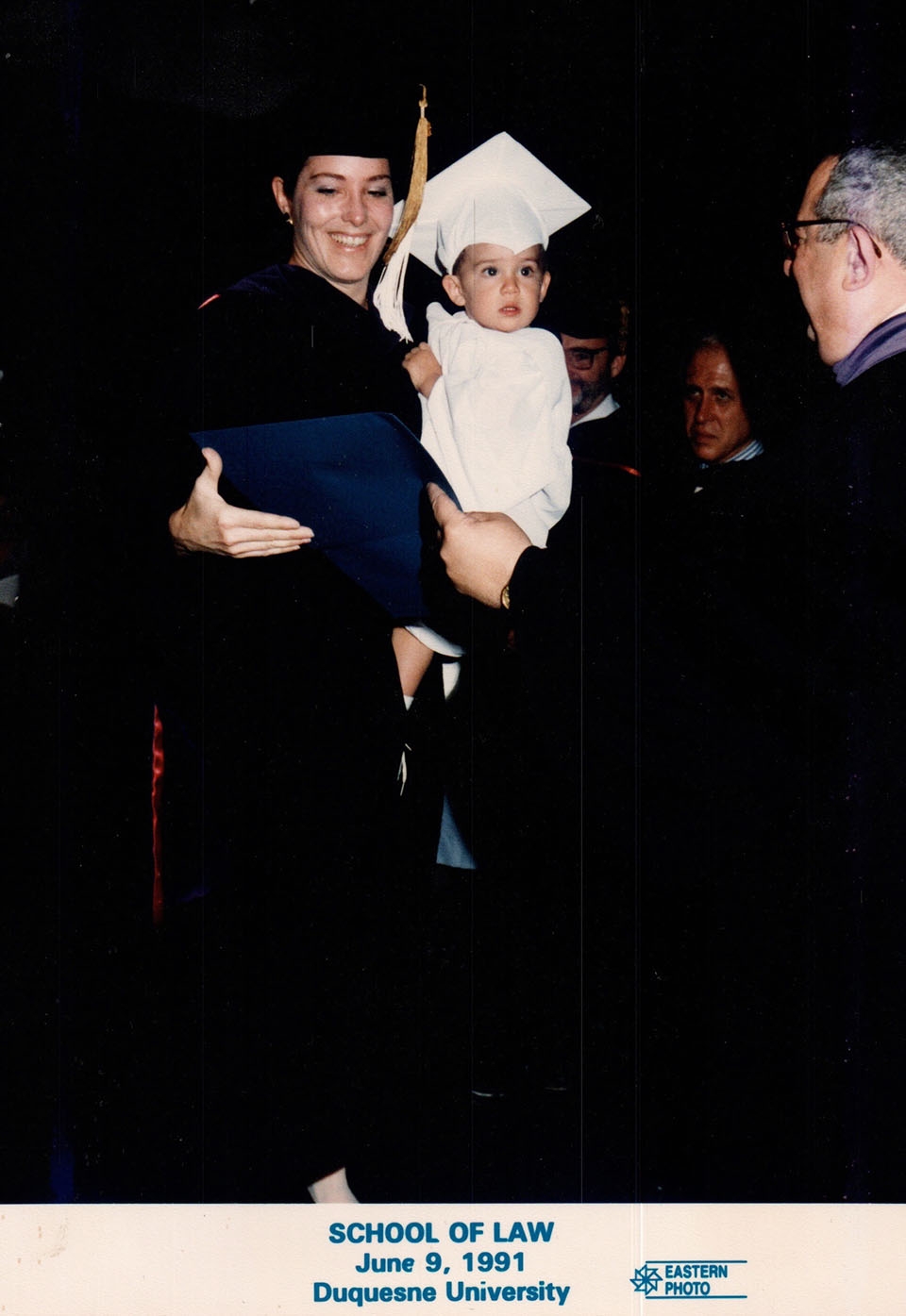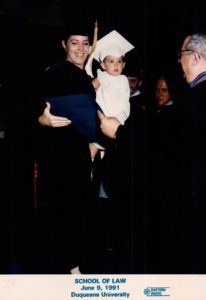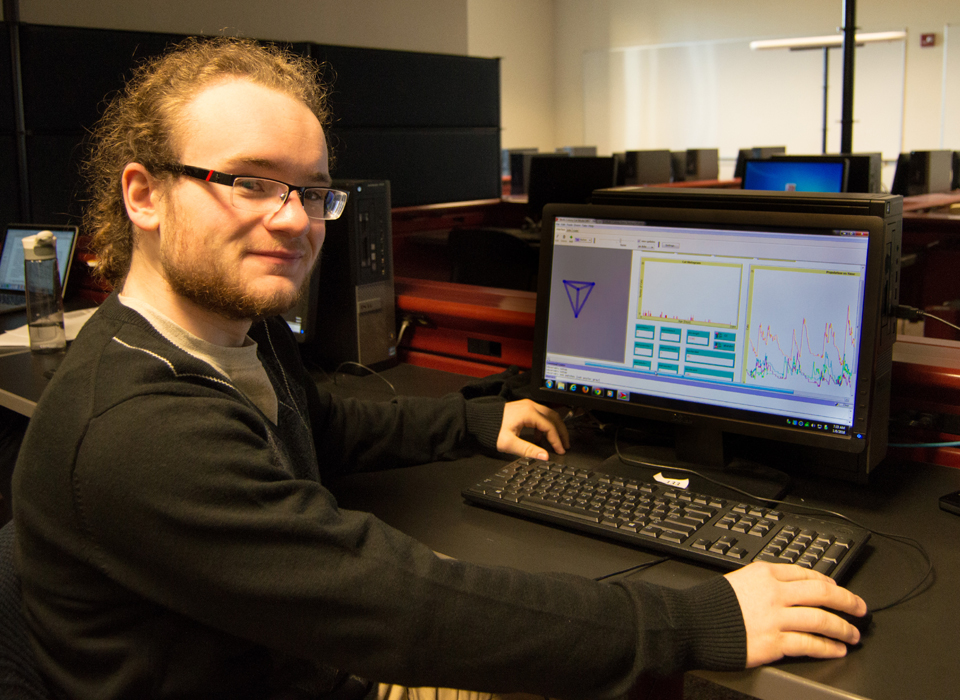
Tarasi, shown at graduation from Duquesne School of Law, carried her young son across the stage. She is now running in a primary for a local US House seat.

Tarasi, shown at graduation from Duquesne School of Law, carried her young son across the stage. She is now running in a primary for a local US House seat.
Raymond Arke | News Editor
11/07/17
11/09/17 UPDATE: Comment added from the Aaron Anthony campaign
As the calendar gets closer to the 2018 midterm elections, a variety of candidates continue to emerge. In the nearby 12th Congressional District, two Duquesne alumni are part of a five-person race for the Democratic nomination to oppose Keith Rothfus (R-PA).
One of the candidates, Beth Tarasi, graduated from Duquesne School of Law in 1991. She described the experience as “tough, but rewarding,” especially because she had more to worry about than just her studies.
Her first son was born during finals in her third year.
“To have a baby in the middle of law school was a shocker … [and] a blessing,” she said.
Tarasi credited Duquesne and her professors for helping her as she juggled being a student and a new mom. She remembered being able to bring her son to class with her as he slept in the back.
“[Duquesne] worked with me … they really went out of their way to help me,” Tarasi said.
She also cited her law school education as a major selling point to voters.
“[The Duquesne law degree] shoots me lightyears above other people,” Tarasi said, citing her classes on tax code being exceptionally helpful, as Republicans in Congress are currently working on passing major tax reforms.
One of Tarasi’s professors, Mark Yochum, is still teaching at Duquesne, where he is now an adjunct. Tarasi said his classes made an impact on her.
“When I’m writing the real tax bill, I’ll be calling Professor Yochum,” she said, noting his expertise.
Before attending Duquesne, Tarasi grew up in Western Pennsylvania and attended the University of Pittsburgh on a basketball scholarship. Since then, she has stayed local, living in Sewickly and running a litigation firm as a trial attorney for 27 years.
“We’re Western Pennsylvania strong,” she said.
She described herself as “deeply involved in the community” and “politically aware and active,” participating in local Democratic Party work.
Tarasi believes that living in the region so long and representing a variety of clients through her law firm has given her an understanding of the 12th District.
“I have a pulse of … not just my neighborhood, but the region,” she said. “I’ve represented clients from all over the area and that gives me visibility of the challenges people face.”
Her decision to run for the U.S. House seat was fueled by a dissatisfaction of the current political scene.
“I’m increasingly frustrated by what is going on in politics,” she said.
Specifically, she mentioned the growing divide between the two parties and lack of compromise. Tarasi said the continued support of Roy Moore’s Senate campaign in Alabama, even in the face of multiple accusations of sexual harassment of teenage girls, is an example of extreme partisanship.
“In Alabama, people are going to vote for [Moore] just because he has an ‘R’ behind his name. I think that’s morally wrong,” she said.
Another issue she discussed was the current Republican tax plan which has been passed separately by the House and the Senate.
“The 12th [District] is not a bunch of wealthy people. They’re not going to be benefiting from the plans Washington has right now. This is not fair and not right,” Tarasi said.
According to data from the FEC Quarterly October 2017 report, which shows candidates that have over $10,000 in campaign contributions, Tarasi leads the Democratic field with $82,255 cash on hand.
She looks forward to the rest of the campaign.
“I’ve always been a fighter,” Tarasi said.
The other Duquesne graduate running in the primary is Ray Linsenmayer. Linsenmayer is currently a finance and investor relations consultant to Pittsburgh-based energy and technology businesses. He also grew up in locally, in McCandless.
Linsenmayer graduated in 1991 with a degree in political science. He fondly remembered his time on the Bluff.
“I really enjoyed my time at Duquesne. It was the first time I lived away from home, and it took me a little while to find my footing. However, I met an exceptional group of people – many of whom I am still friends with today,” Linsenmayer said. “I was a founding member of the Duquesne Crew [men’s rowing team] and I learned a tremendous amount, both in the classroom and from those around me.”
After graduating, Linsenmayer eventually found work for the Department of Defense.
“Working at the Pentagon was a great experience. I was able to help the government cut its costs and build energy security by working with private-sector companies to put large solar, wind and biomass projects on Army land,” he said.
He believes that the work he did there had benefits for everyone.
“The best thing about this project was that it was a win-win situation for a lot of groups. Renewable energy groups loved the project for obvious reasons, but the generals did, too, because they got both power at a lower cost and enhanced energy security for our troops.,” Linsenmayer said. “Coming up with win-win solutions is a major campaign issue for me.”
He also highlighted the work he has done in the business sector.
“I’m a finance guy by training, and I have spent most of my career helping companies build their businesses and provide jobs for American workers,” he said.
Linsenmayer was also very involved with local Democratic politics before getting involved in the race.
“I was previously the head of the North Pittsburgh Democratic Volunteer Corps, a grassroots organization that trained and deployed over 150 active campaign volunteers to get more than 25 Democrats elected in northern Allegheny County,” he said.
This has allowed him to enter with over 100 campaign-ready volunteers and he has received four endorsements from local elected officials, he added.
He received another endorsement yesterday, when Duquesne environmental science professor, John Stolz, dropped out of the primary race and gave his backing to Linsenmayer, according to a Linsenmayer press release.
Some of the campaign issues that Linsenmayer highlighted as important were affordable healthcare, finding a solution to the opioid crisis and improving the public school system.
Linsenmayer also encouraged Duquesne students to step outside their comfort zones.
“Make sure to try new things. Some of the best experiences I had at Duquesne, like Crew, are things I never dreamed I would be doing when I was a senior at [North Allegheny High School]. In essence, always take a swing,” he said.
He also suggested that students become more aware and involved in politics.
“I think each and every one of us needs to be active and engaged in the political process so that we can keep our democracy strong and safe … My advice to anyone who wants to be involved is to walk into a campaign office anywhere in the city, and offer to volunteer,” Linsenmayer said.
One of the other challengers is Tom Prigg. Prigg was a recon sniper in the 82nd Airborne, before going to the University of Pittsburgh and becoming a “brain researcher for 20 years,” he said.
He was motivated to run because he was tired of uninspiring politicians.
“The problem is the people in power benefit from the way things are now. There’s no interest to improve … They profit from corporations … from divisiveness,” Prigg said.
He said that his background as a scientist can be a breath of fresh air in a body dominated by “lawyers and business people.”
“Science is about abstract ideas. [It is] about using information as a way to find new connections or solutions … You need different perspectives,” Prigg said.
Prigg’s campaign is focused on getting voters engaged, according to Cate Axtman, his campaign manager.
“The 12 District is the result of some very specific gerrymandering such that it takes almost 2.5 hours to travel from one side to another. There are also large sections that do not have easy access to the Internet,” she said. “This makes a voter outreach strategy challenging. We have done a great deal to date but there is still much to do.”
Axtman also said that the fundraising has been going well so far.
“Currently, we have raised funds from donors that live in 36 different states across the country with a median donation of less than $50,” she said.
Prigg’s styled his campaign after a famous example from the 2016 election.
“A key component of our campaign, like that of Bernie Sanders … is to receive as many small donations as possible. We want to eliminate the power that comes with a massive donation from a single source,” Axtman said.
Axtman said that Prigg, if elected, would want to break through gridlock in Washington.
“Tom is adamant that we worry less about “Democrat” or “Republican” and spend our time focused on the best way to solve a problem,” she said. “We all have to move beyond the name calling and vitriol and instead get to work fixing those things that are broken.”
Some of the issues that Prigg wants to work on include education finance reform, including skills-based training into education and the creation of high-value jobs, according to Axtman.
Prigg encourages students to get turn out for the primaries.
“Sitting back and doing nothing is passively letting your life slip away … at least go out a single day and vote,” he said.
Aaron Anthony, another primary challenger, said he wants to focus on values in the campaign.
“I’m honored to have built a values-driven campaign with support from all 50 states, rooted in community service, compassion, and listening,” he said. “Our movement to #flipthe12th represents a new generation of Democratic organizing, and we believe that our messages focused on education, healthcare and restoring our faith in democracy is the best vessel to take on Keith Rothfus.”
Primary elections will be held on May 15, 2018. The general election is Nov. 6, 2018.
Contact information for the Adam Campbell campaign could not be found.
Keith Rothfus’ office did not return a request for comment by press time.




